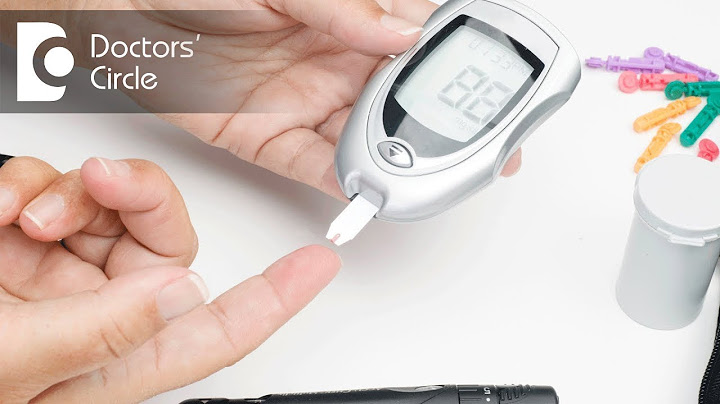Show
Ask a DoctorMy son’s wife is diabetic, and they’re planning a backwoods camping and hiking trip that will last 16 days. They’ve never done anything like this before, and I worry about them. I trust my daughter-in-law to take all the necessary precautions, but what if something happens and she loses her insulin on the trail? What is the first aid for a diabetic emergency? What can you do to bring your blood sugar down quickly?
Doctor’s ResponseWhen you have diabetes, your blood sugar may spike for a number of reasons, including eating a heavy meal, not taking medication as directed, lack of exercise, illness, or stress. The fastest way to bring down your blood sugar (glucose) levels is to take insulin, but this should only be done as prescribed by a doctor. The next quickest way to lower blood sugar is to exercise. But if your blood glucose is above 240 mg/dl, you should check your urine for ketones. If ketones are present, exercise may not be recommended. Reducing the amount of food you eat at mealtime may also help. A doctor or dietician can make recommendations if changes in your diet or meal plan could help. As medical science has advanced, there has become a big push to get tighter and tighter control of blood sugar levels. The highs and lows needed to be smoothed out to get as close to normal physiology as possible. This has become the mantra for diabetic care. Just like an elite athlete who is always training, the person with diabetes always needs to be working to maintain normal blood sugar levels. This is a relatively new concept. Not so long ago, the hope was that one insulin injection a day would be enough to return those with diabetes to their normal state. Blood sugars were allowed to fluctuate over a wide range, and patients and their doctors were comfortable with the trade-off. Once or twice a day shots didn't affect lifestyle. But just having "OK" control of blood sugar levels wasn't "OK". Research showed that blood sugars should be kept within a tight range of normal, and technology should adapt to make that happen. Smaller glucose meters were developed. Insulin pumps became more routinely used. Children with diabetes weren't ostracized; they too could do what they wanted and their friends took the needles and blood tests in stride. There are no days off. Diet, exercise, and medication need to be optimized every day to maintain body performance, avoid the complications of diabetes, and prolong a long and healthy life. The difference is that the reward for all this work comes later. An athlete will be cheered every day on the field. The individual with diabetes gets to cheer thirty years later playing with grandchildren. For more information, read our full medical article on diabetes. References Benjamin Wedro, MD, FACEP, FAAEM coauthored this article. REFERENCE: American Diabetes Association. Hyperglycemia (High Blood Glucose). 7 December 2018. 2 January 2019 .Christy L. Parkin, MSN, RN, CDE. How Do I Quickly Bring Down My Blood Glucose? January 2011. Diabetes Forecast. 2 January 2019 .
If you have diabetes, your body isn't able to regulate blood sugar properly, either because the pancreas doesn't produce insulin (type 1 diabetes) or the body has become resistant to it (type 2 diabetes). As a result, people with diabetes have to carefully manage their blood sugar levels through diet, exercise, and medications to make sure it stays in a healthy range. But sometimes, blood sugar can become too high. In many of these cases, people with diabetes will be able to quickly lower blood sugar on their own, by taking more insulin. However, other times, they may need to visit the ER for immediate medical attention. Here's how to tell if your blood sugar is too high and what you'll need to do in order to lower it quickly. What is hyperglycemia?People with diabetes are considered to have high blood sugar, or hyperglycemia, if blood glucose levels are higher than:
While there are other conditions that can cause hyperglycemia, it is most commonly linked to both type 1 and type 2 diabetes. That's why it is important for people with diabetes to check their blood sugar using blood glucose meters — with the goal of keeping levels from getting too low or too high. In addition, there are other signs and symptoms of high blood sugar you might notice. High blood sugar symptomsThe most common symptoms of hyperglycemia are:
"If someone … has hyperglycemia, it would mean they would be very thirsty, tired, they might be urinating more frequently and basically not feeling well," says Sam Zager, M.D. a family medicine physician in Maine. How to lower blood sugar quicklyHyperglycemia is not automatically an emergent situation. Anyone with diabetes knows high blood sugar readings will happen, and it's okay, as long as it doesn't last too long or get too high. If it does occur, here are a few ways to quickly lower blood sugar on your own: Take more insulinInsulin can be used to treat acute cases of high blood sugar for people with diabetes. People with type 1 diabetes (who always use insulin) and some people with type 2 diabetes (who sometimes use insulin) can give themselves an extra dose of insulin to quickly lower their blood sugar to safer levels. How much to take depends on the situation and what your doctor recommends. Drink waterWhen you have high blood sugar, you may experience frequent urination as your body tries to get rid of the extra glucose. Losing this fluid can cause dehydration and make hyperglycemia symptoms even worse. It's important to drink water when you have hyperglycemia in order to stay hydrated and help your body regulate and lower blood sugar. But drinking lots of water won't necessarily lower blood sugar on its own. For more information, read about how much water you're supposed to drink a day. ExerciseExercise isn't always the safest or most effective way to quickly lower blood sugar. It is important to note that exercise only works if there is insulin present, whether naturally or through injection, so that glucose can get into the cells to be metabolized. If there is no insulin, your body will start burning fat for energy, and this could lead to a dangerous condition called diabetic ketoacidosis. People with type 1 diabetes should not exercise if they have hyperglycemia. However, exercise can lower blood sugar for most people with diabetes — it just shouldn't be used in emergency situations. In a 2013 study in the journal Diabetes Care, more than 5,000 people with diabetes recorded their blood glucose levels before and after exercising for as little as 10 minutes. Overall, more than 75% of people saw their level decrease an average of about 17%. Overall, Zager says that exercise is important for managing diabetes, but warns that it isn't a great short-term fix. For more information on how to control blood sugars in the long-term, learn about the 6 best ways to lower blood sugar naturally. When to seek medical attention in an emergencyFor people with type 1 diabetes, untreated high blood sugar can lead to a life-threatening condition called diabetic ketoacidosis, or DKA. When there is no insulin and glucose can't get into cells, your body starts breaking down fat into a fuel called ketones. If ketones build up in your blood, it becomes dangerously acidic. DKA can cause very serious health complications — such as fluid building up in the brain, kidney failure, and cardiac arrest. If your blood sugar is above 240 mg/dL, you should check your urine for ketones, a sign you may be at risk for DKA. You can do this with an at home test, but you also should contact your doctor. If there are ketones in your urine, you should go to the emergency room. Other symptoms of DKA include:
In rare occasions, DKA can occur in people with type 2 diabetes, but the more common complication for people with type 2 is called hyperglycemic hyperosmolar state, or HHS. HHS occurs when blood glucose levels are high for an extended period of time. The extra sugar is passed into the urine, causing the person to urinate frequently and become severely dehydrated, just like with DKA. For people with type 2 diabetes, blood sugar above 600 mg/dL indicates HHS. Other symptoms include:
These symptoms generally come on slowly, but you should contact your doctor immediately. In the ER, doctors will likely use insulin to lower your blood sugar, as well as give you fluid and electrolytes, to keep your heart, kidneys, muscles, and nerve cells functioning properly. TakeawaysFor people with diabetes, a single instance of high blood sugar is generally not an emergency, as long as it is addressed. Usually, taking an extra dose of insulin will quickly lower your blood sugar back to normal levels. However, if you are on insulin and run out, or have symptoms of DKA or HHS, you should get medical attention right away.
Honah Liles is a freelance journalist based in Maine who writes primarily about science, health, and DIY projects. Read more Read less What foods can lower blood sugar quickly?Best foods that help lower and control blood sugar. Whole wheat bread.. Fruits.. Sweet potatoes and yams.. Oatmeal and oat bran.. Legumes.. Garlic.. Fatty fish.. How can I lower my blood sugar without insulin?14 Easy Ways to Lower Blood Sugar Levels Naturally. Exercise regularly. ... . Manage your carb intake. ... . Eat more fiber. ... . Drink water and stay hydrated. ... . Implement portion control. ... . Choose foods with a low glycemic index. ... . Try to manage your stress levels. ... . Monitor your blood sugar levels.. What drink lowers blood sugar?When it comes to hydration, water is the best option for people with diabetes. That's because it won't raise your blood sugar levels. High blood sugar levels can cause dehydration. Drinking enough water can help your body eliminate excess glucose through urine.
|

Related Posts
Advertising
LATEST NEWS
Advertising
Populer
Advertising
About

Copyright © 2024 en.ketajaman Inc.


















